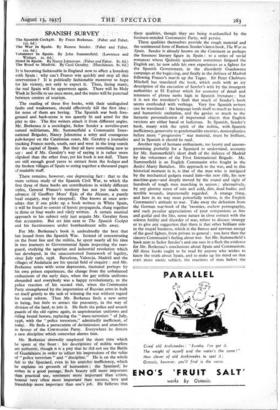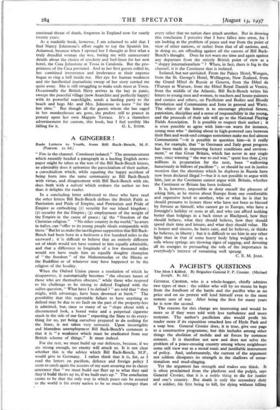SPANISH SURVEY
The War in Spain. By Ramon Sender. (Faber and Faber.
- - I2S. 6d.)
IT is becoming fashionable in England now.to. affect a boredom with Spain : why can't Franco win quickly and stop all this intervention ? It is politically fashionable moreover to hope for his victory, not only to expect it. Then, facing many, the real Spain will be uppermost again. There will be Holy Week in Seifile to once more, and the trains will be punctual 6etvieen centres of totirisin. _ _ . The .reading of these five books, with their undisguised faults and weaknesses, should effectively kill the first idea : for _none of them are boring. The Spanish war both fore- ground and. back-scene is too queerly lit and acted for the play to tire. The five writers attack it from different angles. Mr. .Borkenau. is a, sociologist, Sefior Sender a novelist-poet turned militiaman, Mr. Summerfield a Communist Inter- national Brigader, Nancy Johnstone a witty and courageous pub-keeper on the Catalonian coast, Mr. Gerahty a journalist tracking Franco north, -south, east and west in the long search for the capital of Spain. But they all haVe something new to say : and if Mr. _Gerahty's way of saying it is rather more slipshod than the other four, yet his book is not dull. There are still enough good yarns to extract from the bodegas and the broken villages of Spain to string together a thousand pages of readable stuff.
.. There. remains, however, one depressing fact : that to the more serious ,study of the Spanish Civil War, to which the first three of these books are contributions in widely different styles,. general Franco's territory has not yet made one advance_ (if Geoffrey Moss' Epic of the Alcazar, a purely local enquiry, :may be excepted). One knows at once now- adays. that if one picks up a book written in White Spain, it will be found to consist of heroic propaganda, slung together in, or four weeks and vilely written. A certain nautical approach to his subject only just acquits Mr. Gerahty from that accusation. But set him next to The Spanish Cockpit and his facetiousness under bombardment wilts away.
For Mr.. Borkenau's book is undoubtedly the best that his issued from the Spanish War. Instead of concentrating on the front line and the militia, he spent nearly all his time in two journeys to Governmental Spain inspecting the rear- guard, studying the agrarian and industrial revolution which has, developed, in the unaccustomed framework of legality, since July 19th, 1936. Barcelona, Valencia, Madrid ands the villages of 'Andalucia are his special field of enquiry : and Mr. Borkenau notes .with:some depression, tinctured perhaps by his own prison experiences, the change from the unbalanced enthusiasm of the early days, when the gay 'militia uniforms abounded and everybody was a happy revolutionary, to the police reaction of his second visit, when the Communist Party strengthened by the importation of Russian arms in bulk set itself grimly to the task of winning the war without regard for social reform. Thus Mr. Borkenau finds a • new army in being, but little to attract the peasantry, in the way of division of the land, to join it. He finds the police and assault guards of the old regime again, in unproletarian' uniforms and riding brutal horses, replacing the " mass-terrorism " of July, 1936, with' the " police terrorism," admittedly inefficient, of today. He finds a persecution of deviationists and anarchists in favour of the Communist Party. Everywhere he detects a new discipline which somewhat alarms him.
Mr. Borkenati shrewdly employed the short time which he spent . at: the front : his descriptions of militia warfare are authentic, though it is pity that he.dictnot see the Battle of Guadalajara in order 'to adjust his impressions of the valite of "police terrorism'' and "'discipline." He is on the whole fair to the Spaniard, even in his anarchiC inefficiency, which he explaini 'on grounds. of hUmanism ; the Spaniard,' he writes in a good passage, finds beauty still more iroportant than practical use, sentiment more important 'than ' action, honour very often more important than success," love and friendship more important than one's job. He' believes that these though (they are being manhandled by the business-minded Communist Party, will persist.
These qualities themselves provide the rough material and the sentimental form of Ramon Sender's latest book, The War in Spain. Sender is already known on the Continent as perhaps the foremost literary figure in Spain : to a series of social romances whose Quixotic quaintness sometimes fatigued the English ear, he now adds his own experiences as a fighter for the Spanish Government, in the disorderly Guadawana Campaign at the-beginning, and finally in the defence of Madrid following Franco's march up the Tagus. Sir Peter Chalmers Mitchell has translated the book, which ends with an icy description of the execution of Sender's wife by the insurgent authorities at El Espinar which for economy of detail and tenseness of phrase ranks high in Spanish literature but it is not the translater's fault that much of Sender's book seems overloaded with verbiage. Very few Spanish writers can be translated : the language lends itself so much to heroics and humanistic exaltation, and the genius so much to the fantastic personalisation of impersonal objects that English versions are either banal or ludicrous. In Spanish, Sender's book, meaty with the spirit of the militia, with Spanish inefficiency, generosity to gentlemanlike enemies, demoralisation before more " progressive " war material, must be brilliant, and in Spanish it should be read.
Another type of humane enthusiasm, too hearty and uncom' promising probably for a Spaniard to understand, accounts for Mr. Summerfield's short draft of the defence of Madrid by the volunteers of the First International Brigade. Mr. Summerfield is an English Communist who fought in the Andre Marty Battalion. His approach to the war, and to this historical moment in it, is that of the man who is intrigued by the mechanical gadgets round him—his new rifle, his new machine-gun—and deeply moved by the sound and sight of hundreds of tough men marching in unison ; alternatively, by any gloomy scene of rain and cold, dirt, dead bodies and terrible wounds, impersonally regarded. A strange thing, and here in its way most powerfully written, is the English Communist's attitude to .war. Take away the defeatism from the German war-book of the 'twenties, eschew pornography, and such peculiar appreciations of your companions, as fine and gutful and the like, sense nature in close contact with the solemn futility, and disorder of war, refuse to discuss strategy or to give any suggestion that there is that other brilliant side to the stupid business, which is the finesse and nervous energy of the good fighter, from private to general : you have then the sincere Communist's feeling about war. Set Mr. .Summerfield's bOok next to Sefior Sender's and one sees in a flash the evidence for Mr. Borkenau's conclusions about Spain and Communism. All ;three books ought to be read by anyone who wishes to know the truth about Spain, and to make up his mind on that even more exotic subject, the reactions of man before the continual threat of death, forgotten in England now for nearly twenty years.
As a readable book, however, I am ashamed to add that I find Nancy Johnstone's effort ought to top the Spanish list. Ashamed, because when I opened her I thought at first what a truly dreadful woman she was, boring me with unnecessary details about the choice of crockery and bed-linen for her new hotel, the Casa Johnstone at Tossa in Catalonia. But the pro- prietress of the Casa persisted. And as her first guests rolled in, her combined irreverence and irrelevance at their expense began to ring a bell inside me. Her eye for human weakness and the hardboiled journalistic sweep of her story carried me quite away. She is still struggling to make ends meet at Tossa. Occasionally the British Navy arrives in the bay in panic, sweeps the peaceful village (now Anarchist and perfectly happy) with its powerful searchlight, sends a landing party to the beach and begs Mr. and Mrs. Johnstone to leave " for the last time." But though all the guests whom she has caged in her monkeyhouse are gone, she prefers still to prance in penury upon her own Mappin Terrace. It's a shameless advertisement for custom, this book, but I feel terribly like







































 Previous page
Previous page